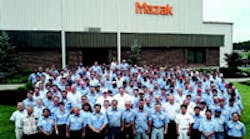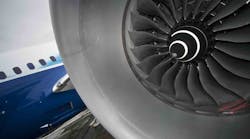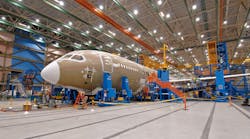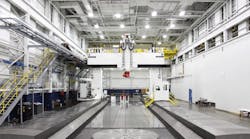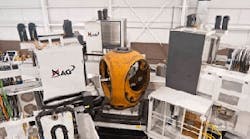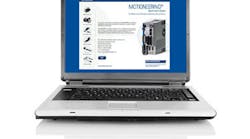In a banner year, Mazak Corp. (U.S.A.) celebrates its 30th anniversary, accelerating sales, and a historic first — exporting machines to Japan.
By Patricia L. Smith, executive editor
In July 1974, Mazak Corp. (U.S.A.) started its U.S. manufacturing operations in Florence, Ky., to be more fully integrated into the American market. The strategy paid off. In the 30 years since, the builder has proven that it's possible to efficiently and competitively manufacture machine tools in the U.S. And for the first time, the U.S. operation is exporting into the Japanese market.
Mazak Corp. was set up to succeed from the beginning, according to Brian Papke, president. “Teruyuki Yamazaki [chairman of Japanese parent company Yamazaki Mazak Corp.] had a long-term strategy to build the organization. He understood that to be truly successful in this market, we had to establish a manufacturing presence in the U.S.”
The idea of a Japanese builder making machine tools in the U.S. seemed like a risky proposition in 1974. At the time, the currency conditions made it substantially more expensive for Mazak to produce in Kentucky rather than export from Japan. The company dealt with these unfavorable conditions in the only way it could — by making its manufacturing operations as cost-efficient as possible.
“We've found a way to be very competitive in the U.S.,” says Papke. “The key is that you have to invest in the right production systems, continue to modernize your factory, put in lean-manufacturing concepts, and cross-train your people.”
Over the past 30 years, the company has continually improved its operations. In particular, Papke points to four milestone years in Mazak history: 1983, 1987, 1996, and 2002.
In 1983, Mazak completed its first factory-automation program by installing two types of its own flexible manufacturing systems (FMS). “Putting FMS into our plant made our manufacturing operations more cost efficient,” comments Papke. It also showed Mazak customers that the technology worked and made economic sense.
When Mazak doubled the size of its facility in 1987, it also integrated its second generation of FMSs along with a computerintegratedmanufacturing system. “We made a substantial investment that allowed us to increase production dramatically,” says Papke.
But more was to come. By 1996, the company was in the position to be a “total solutions provider.” This was the result of a three-step strategy — called “The Trihedron Concept” — in which Mazak expanded its manufacturing operations to make them more agile, established a National Technology Center, and introduced its Optimum service and support program.
After the machine tool industry peaked in the late 1990s, Mazak devised another ambitious production strategy, which it called Production on Demand. By 2002, the company had invested $20 million — in the teeth of the worst machine tool recession in recent memory — to thoroughly re-engineer its design, production, and assembly systems. With this move, the company moved from make-to-forecast to make-toorder agile manufacturing.
“We embraced the tenets of lean manufacturing, putting in a modular-assembly system, multitasking equipment, and new FMS technology. We also incorporated our own multitasking equipment, which allows us to practice a ‘done-in-one' concept. By making parts complete on a single machine, we have eliminated waste, minimized the need for fixturing, and reduced in-process inventory. But to be truly effective, we went back to the product design itself,” comments Papke.
This new focus entailed a product redesign aimed at reducing manufacturing and assembly times. This effort culminated in the Nexus line of vertical machining centers and turning centers.
Nexus machines sport modular designs in which various modules are shared across a family of machines. The machines also have fewer components than previous models.
“The Nexus substantially improved over previous models. These machines are faster, more accurate, and even more reliable,” assures Papke. “They're also a better value for our customers. That's because our new manufacturing system lets us build these machines more efficiently and at less cost than before.”
Currently, Mazak produces over 20 different models in Kentucky. “We met our goal to reduce leadtimes on these machines to three weeks for a VMC and two weeks for a small turning machine,” reports Papke. “We're now producing 120 machines a month and quickly nearing plant capacity. Frankly, it's been a real success story.”
The line has been so successful that the Florence facility is exporting machines to Yamazaki Mazak. “For the first time in our history, we're shipping as many as 10 machines a month to our parent company,” comments Papke.
Forecast for the future
Mazak Corp. will continue its commitment to the U.S. market in the years to come, asserts Papke. And it will continue to invest in its manufacturing operations. “I have a hard time believing that companies cannot be efficient and competitive manufacturing in the U.S. as long as they invest in their people and efficient manufacturing technology,” he says.
The company will also continue to design some equipment that is not manufactured at other Mazak plants. Papke points to the Nexus multitasking machines as one possible area for expansion into the global marketplace.
“We will be relentless in our pursuit of new products,” says Papke. “The product lifecycles are shorter than they have been in the past, and to provide productivity improvements for our customers, we have to constantly introduce machines that are faster, more flexible, and can do more than ever before.”
